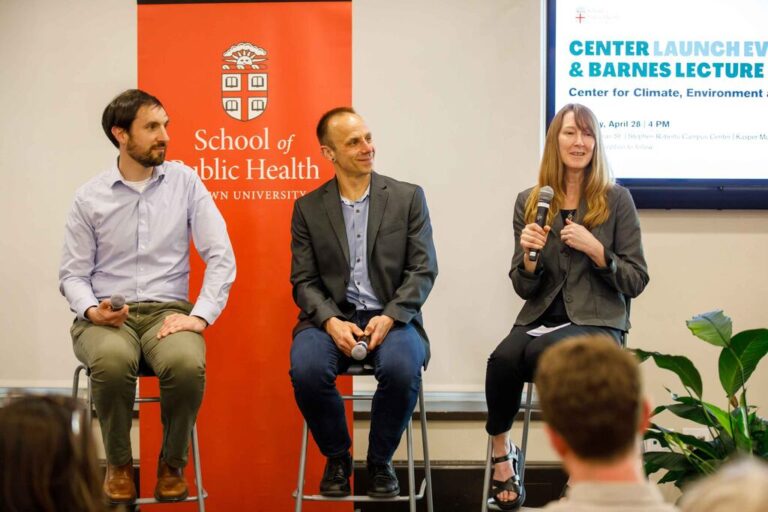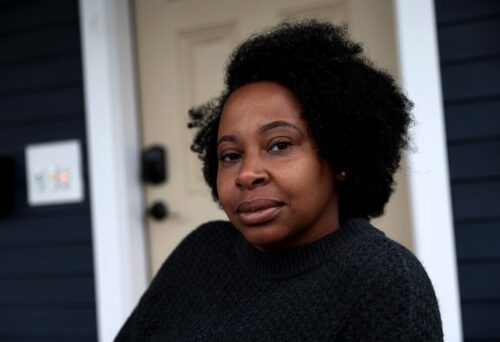PROVIDENCE — How does exposure to “forever chemicals” impact pregnancy? Is there a connection between firearm ownership and elevated lead levels in children?
These are the kinds of studies Brown University carried out through its Center for Children’s Environmental Health in recent years, placing an emphasis on solutions-oriented research, said environmental epidemiologist Joseph Braun, the center’s director.
Now, with those successes and others, the Ivy League institution is expanding and re-branding the center.
Last month, school officials formally unveiled the new Center for Climate, Environment and Health in the university’s School of Public Health — an endeavor that will “draw on expertise from across the university to study and address the impacts of climate change and environmental toxins on well-being,” school officials said.
Braun spoke to the Globe about the timing behind the launch of the new center, its research, and whether the Trump administration could hinder its work.
Q: Why was this the right moment to bring all these components together in one place at Brown?
Braun: In the last two years, we’ve had several new hires in Brown related to issues of climate and human health, as well as environmental chemicals, as well as more community-engaged research. And so we can really bring some depth of expertise to bear on some of these issues that are really important.
I think the moment is right because we are facing increasing threats from how the planet is changing in terms of climate — whether it’s tropical storms or heat, as well as rainfall events, and even things like chemical pollutants. I think increasingly we’re recognizing that we’re exceeding what has been called the “planetary boundaries.” And in some cases, we’re reaching these tipping points, or these points where we are going to make life very unpleasant on this planet if we don’t have some action, either to reverse that or to mitigate these damages that we’re doing.
Do you think that message is being received more? Do you think that you are getting through with the work that you’re doing?
It’s a good question … I think people generally acknowledge that environment does influence our health. I mean, we have to look no further than, like, the effects of smoking on cancer, right, to find out that environment can affect our health. So, whether that means people are turning that into action, I don’t know.
But I do think … one of the things that our center is really dedicated to is not just doing science, but to find solutions, or to do what we call solutions-oriented research.
Are you at all concerned about how the center’s work could be hampered by the current presidential administration?
I think it’s on everyone’s mind, yes. I think we’re all concerned about what this administration’s priorities are relative to our own. But I think there is an alignment between a lot of the things that [US Heath and Human Services Secretary Robert F.] Kennedy [Jr.] is saying about studying chronic determinants of chronic disease and studying chemical exposures, and you know, the secretary has spoken at length about those things, and there’s many members of our center that engage in that type of work.
And I think also in line with making America healthy again, there is the need to think about how do we make sure people are healthy when there are wildfires, when there are major heat events? So I think there is a need to address health in the face of any exposure or disaster that we face.
You mentioned Secretary Kennedy. We’ve seen these widespread rollbacks to the Department of Health and Human Services over the last month or so. Do you think that elevates the need for non-government institutions to pursue this work, or does that hurt what you are doing?
I think the uncertainties regarding [National Institutes of Health] funding to these areas certainly makes it harder to do this work, and there’s a lot going on in that area right now in terms of funding higher education institutions to carry out the research.
The administration has said that it intends to hold over $500 million from Brown specifically. Does that hurt you as well?
That would greatly impede our ability to do the work that we’re trying to carry out. And I think private foundations and philanthropists can only fill a fraction of that void. So if this work is to be carried out, it really is going to need the funding from the National Institutes of Health.
You went through a long list of past research you’ve been involved in, the center has been involved in. Is there anything in particular that you’ve been most proud of over the years, and something you maybe hope that this reconfiguration will help expand on?
I think some of the things that I’m really proud of is that we’ve managed to bring together some investigators who are doing work in some really diverse areas.
One of them is the work that Erica Walker, who’s a junior faculty member, … she’s doing a lot of work down in Jackson, Miss., trying to address that community’s concerns about environmental health threats.
They have a lot of concerns about water contamination and boil water advisories. And I think having Brown University down there to help address those needs in a community that … isn’t really the focus of, you know, Ivy League institutions … I think this is a real chance for us to make an impact in addressing those concerns down there.
This interview has been condensed and edited for length and clarity.
The Boston Globe’s weekly Ocean State Innovators column features a Q&A with Rhode Island innovators who are starting new businesses and nonprofits, conducting groundbreaking research, and reshaping the state’s economy. Send tips and suggestions to reporter Alexa Gagosz at alexa.gagosz@globe.com.



Comment count: